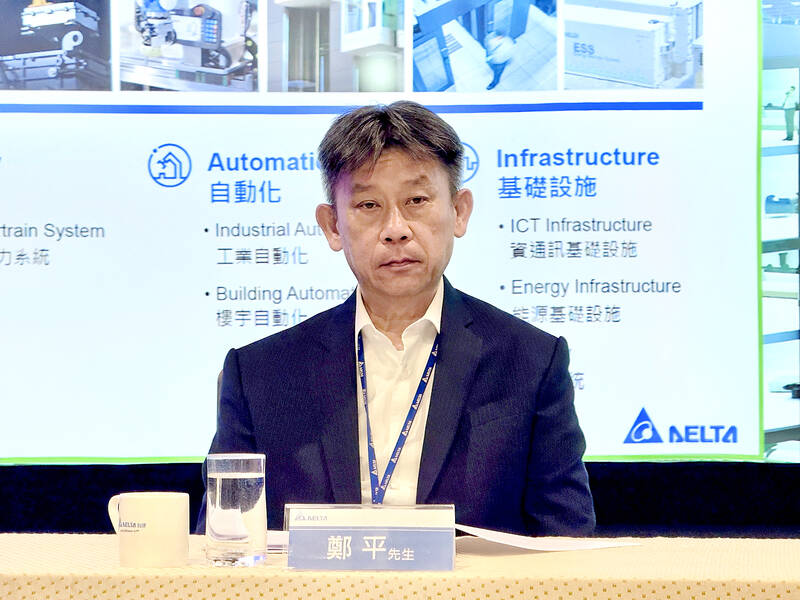Power supply and electronic components maker Delta Electronics Co (台達電) yesterday said that revenue this quarter would continue to grow sequentially, as cloud service providers in North America continue to increase their capital expenditures, which would benefit the company’s shipments of power supplies and heat dissipation parts for data centers.
The company expects its power solutions for infrastructure projects to see a marked increase in shipments this quarter, but its power electronics business would likely see sales flat or fall slightly from last quarter, the Chinese-language Liberty Times (the Taipei Times’ sister newspaper) reported on its Web site yesterday, citing Delta chief executive officer Cheng Ping (鄭平).
The power products for the transportation segment would see sales grow steadily, but shipments of power components for automation businesses still face unfavorable macroeconomic conditions this quarter, Cheng said at a quarterly earnings conference in Taipei.

Photo: Fang Wei-chieh, Taipei Times
Meanwhile, the company’s gross margin this quarter is expected to drop slightly from 34.93 percent last quarter, with the margin of information and communications technology products likely to increase, while the margins of other products remain flat or decline, the company said.
Next year, artificial intelligence (AI) would still be a hot topic and the industry’s growing interest in AI would continue bolstering the company’s power supply business, Cheng said.
However, he said the company would see order loss for DC-DC products for the next-generation Nvidia Corp GB200 servers, which is expected to affect its revenue by up to 25 percent.
The company’s overall revenue would still grow steadily next year on the back of support from other customers, he said.
Cheng’s remarks came as the firm posted third-quarter results that broadly beat expectations.
Third-quarter revenue was NT$112.2 billion (US$3.5 billion), up 4.08 percent year-on-year, but below market expectations due to lower shipments of power products for electric vehicles and industrial automation projects as well as unfavorable foreign exchange rates, it said.
Net profit last quarter marked the highest level for the July-to-September quarter on record, rising 31.79 percent from a year earlier to NT$12.34 billion, with earnings per share of NT$4.75, it said.
Thanks to a better product mix and inventory improvements, its gross margin increased 5.36 percentage points to 34.93 percent and operating margin improved 3.6 percentage points from a year earlier to 14.64 percent, it said.
Power electronics contributed 56 percent to the company’s revenue last quarter, followed by power solutions for infrastructure projects at 22 percent, power products for the automation sector at 12 percent and those for the transportation segment at 10 percent, company data showed.
Delta said data centers composed of AI servers consume considerable amounts of electricity.
The US market might double its power consumption by 2030, reaching 400 terawatt-hours, it said.
As power consumption increases, heat dissipation requirements would also increase, the company said, adding that the newest AI data centers would use liquid-to-liquid cooling systems, which would be a major growth driver for the company in the next two years.
The company has operations in Taiwan, China, India, Thailand, the US and eastern Europe.
In the first nine months of this year, its capital expenditure totaled NT$26.3 billion, the company said.

Taiwan Semiconductor Manufacturing Co (TSMC, 台積電) yesterday said that its investment plan in Arizona is going according to schedule, following a local media report claiming that the company is planning to break ground on its third wafer fab in the US in June. In a statement, TSMC said it does not comment on market speculation, but that its investments in Arizona are proceeding well. TSMC is investing more than US$65 billion in Arizona to build three advanced wafer fabs. The first one has started production using the 4-nanometer (nm) process, while the second one would start mass production using the

When an apartment comes up for rent in Germany’s big cities, hundreds of prospective tenants often queue down the street to view it, but the acute shortage of affordable housing is getting scant attention ahead of today’s snap general election. “Housing is one of the main problems for people, but nobody talks about it, nobody takes it seriously,” said Andreas Ibel, president of Build Europe, an association representing housing developers. Migration and the sluggish economy top the list of voters’ concerns, but analysts say housing policy fails to break through as returns on investment take time to register, making the

‘SILVER LINING’: Although the news caused TSMC to fall on the local market, an analyst said that as tariffs are not set to go into effect until April, there is still time for negotiations US President Donald Trump on Tuesday said that he would likely impose tariffs on semiconductor, automobile and pharmaceutical imports of about 25 percent, with an announcement coming as soon as April 2 in a move that would represent a dramatic widening of the US leader’s trade war. “I probably will tell you that on April 2, but it’ll be in the neighborhood of 25 percent,” Trump told reporters at his Mar-a-Lago club when asked about his plan for auto tariffs. Asked about similar levies on pharmaceutical drugs and semiconductors, the president said that “it’ll be 25 percent and higher, and it’ll

CHIP BOOM: Revenue for the semiconductor industry is set to reach US$1 trillion by 2032, opening up opportunities for the chip pacakging and testing company, it said ASE Technology Holding Co (日月光投控), the world’s largest provider of outsourced semiconductor assembly and test (OSAT) services, yesterday launched a new advanced manufacturing facility in Penang, Malaysia, aiming to meet growing demand for emerging technologies such as generative artificial intelligence (AI) applications. The US$300 million facility is a critical step in expanding ASE’s global footprint, offering an alternative for customers from the US, Europe, Japan, South Korea and China to assemble and test chips outside of Taiwan amid efforts to diversify supply chains. The plant, the company’s fifth in Malaysia, is part of a strategic expansion plan that would more than triple